
By Jean Ryan
I was not with my mother when she died. No one was. She slipped away from this world during the night, leaving on her own terms, unaccountable into eternity. I don’t think she passed away in her sleep; I’m not sure it’s even possible to cross the cosmic threshold with no awareness. In any case, I know she would have wanted to be there, eyes wide open. She always said she was more curious about death than afraid, which impressed me. I wish there had been more warning, time enough to get on a plane. My sister reported that my mother was seeing and talking to people who were not there, behavior we interpreted as confusion caused by her poor circulation. In fact, she was actively dying, moving farther and farther away from us as she journeyed on alone. No one had told us that the dying often see what the rest of don’t; that they will speak to these phantoms in a manner so earnest we begin to doubt our own senses. Is heaven real, has a corner lifted? Or do the minds of our loved ones, unmoored from the task of living, fall back to the beginning? It must be boundless, rudderless, a place of infinite odds, free of time and fact and meaning. What we wanted, my sisters and I, was a tender farewell, a few moments of clarity culminating in the absolution of mercy. Isn’t that what we all want at this point, a last swipe at honesty?
Rarely do these Hallmark moments arrive. Sometimes death is swifter than anticipated. Sometimes we are denied access, for any number of sad reasons. There are those who take their grudges with them as if, at the end of life, there might be a prize for bitterness. Often the dying will drift into a comatose state, unable to see or speak. They may still be able to hear, but what they understand is anyone’s guess. Essentially, they are walled off, immune to our needs. My partner’s mother died this way, leaving me shortchanged, stranded, unable to plead my case. I will never know why she didn’t like me—not that I would have asked. Sometimes the last words we hear are careless, unfortunate. A friend of mine was engaged in a minor family squabble in her mother’s hospital room. Annoyed, her mother muttered, “Shut up, Lisa,” before falling silent herself, forever. Lisa told me it felt like being given a sharp-edged stone she couldn’t put down. The words we most long for at the end are among the most hackneyed and abused. Surprisingly, “I love you” and “I’m sorry” still hold their value and work like magic. Hearing them restores and empowers us, wipes the slate clean. I never heard my mother apologize for anything, and I don’t believe she would have broken with tradition on her deathbed. She held everyone at arm’s length, as if intimacy was a gamble not worth taking. “Cope,” she’d say when we came to her with our problems, a response that became her signature. We laugh about it now, my sisters and I, tossing the word around like a ball.
She was funny, resourceful, unquestionably smart. She decorated for the holidays, painted Easter eggs, put underwear on the dog for amusement. She sewed like mad, ironed our clothes, made the best boxed lunches ever. The fun leached out of her when we grew into adolescents—perhaps we reminded her of her lost youth—but back then she fulfilled her duty. There was only one rule she ignored: she did not keep us safe.
It is difficult for me to believe that my mother didn’t know what my father was up to, at night in our rooms. He was that reckless, that lawless—for years. I shed him when I was 15, molted everything but the damage and moved on, even changed my last name for good measure. He died a few years ago, news that made no difference to me, aside from silent relief that the world had lost another monster. I can’t see any point in fathers, and what’s a mother’s love if it doesn’t have teeth? Fathers, mothers, children—maybe we’re all expecting too much and failing under the pressure. Are we ever what the other had in mind? Maybe we should go back to living in tribes and avoid these unhealthy bonds.
My mother wasn’t big on hugs. She had no interest in her grandchildren. She wasn’t concerned about Roe v Wade being overturned because she was past the age of fertility. Still, when I saw a little old woman yesterday bent over her shopping cart, peering through thick glasses, her short hair flattened to her skull, her thin legs in navy blue sweatpants, the pain took my breath away.
Recently, I found a photo of her I had forgotten. She was smiling at someone, or something, the answer to that question glinting off her glasses. I thought I knew her face and all its guises, but this knew nothing of the years to come, and all the things she could have done, would have done, differently. She was her own woman, not easy to know or love, but each time I look at this picture I want to warn her, to show her a path more yielding, and if that’s not love what is?
If I had reached my mother in time, if I had held her hands in mine and looked into her fading eyes, I would not have heard what I wanted to hear. I know this.
I could have let her off the hook, washed the slate clean myself. “I forgive you,” I could have whispered. But she was dying, and these were not the words I would have her carry into the hereafter. “I love you,” I would have said and left it at that.